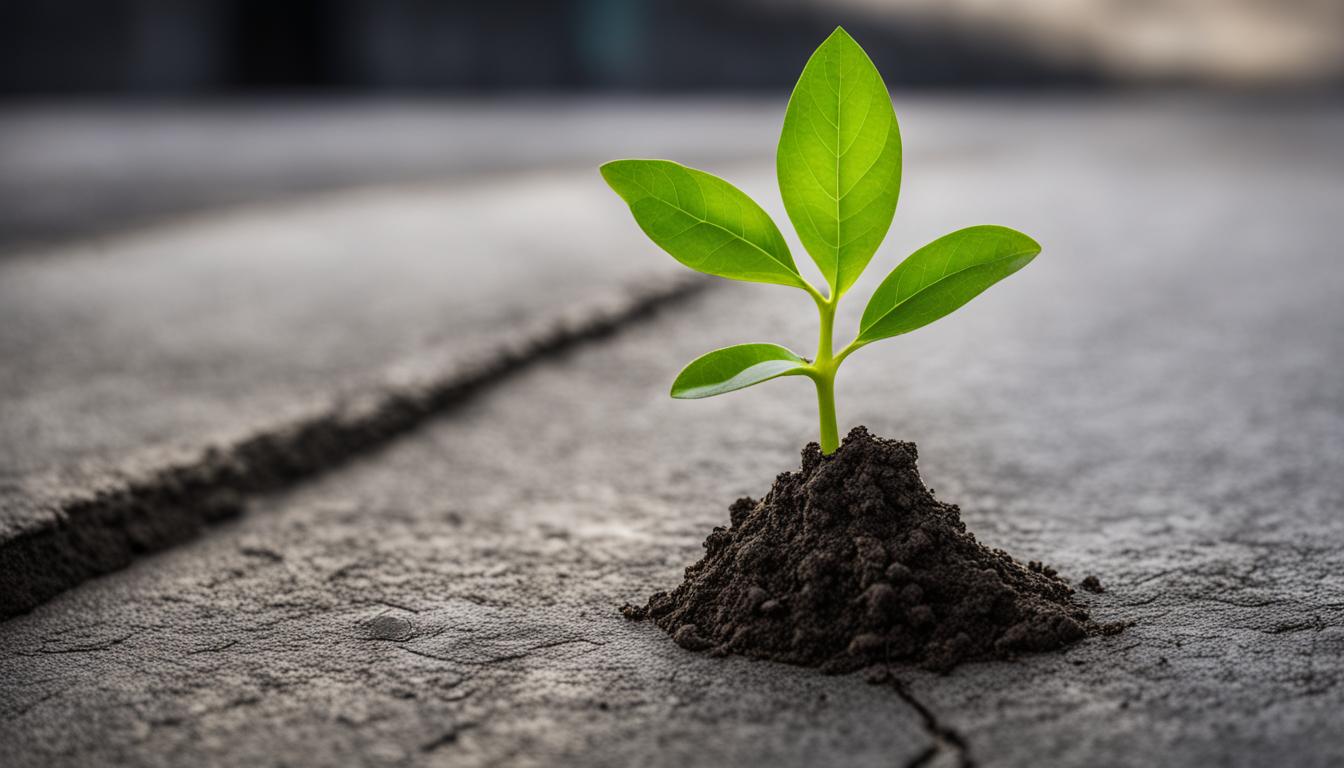Mental resilience is the key to effectively coping with life’s challenges, pressures, and stressors. It involves developing emotional resilience, self-awareness, and adaptability. Building a stronger mind is a process that requires cultivating a growth mindset, developing emotional regulation skills, setting realistic goals, strengthening support systems, practicing self-compassion, stepping out of comfort zones, creating a daily routine, and maintaining strong connections with loved ones.
Key Takeaways:
- Resilience training is essential for improving mental toughness and developing resilience skills.
- Stress management techniques play a crucial role in building mental resilience.
- Building emotional resilience helps individuals effectively cope with and manage their emotions.
- Psychological resilience strategies contribute to developing a stronger mindset.
- Engaging in resilience exercises and activities aids in building mental resilience.
What is Mental Strength?
Mental strength is a fundamental aspect of building resilience and thriving in the face of challenges. It encompasses coping skills, emotional resilience, self-awareness, and adaptability. It is not about never experiencing negative emotions or suppressing them, but rather about developing the tools and mindset to effectively deal with them.

Being mentally strong means finding solutions, bouncing back from adversity, and maintaining a growth mindset. It involves the ability to navigate life’s ups and downs with resilience and determination. Mental strength is not something we are born with, but rather a skill that can be developed and strengthened through practice and intentional effort.
Developing coping skills
- Identifying and managing stress triggers
- Practicing relaxation techniques such as deep breathing and mindfulness
- Engaging in physical activities that promote mental well-being, such as exercise or yoga
- Seeking support from loved ones or professionals when needed
Building emotional resilience
- Recognizing and accepting various emotions
- Cultivating self-compassion and self-care
- Developing healthy ways to express and process emotions
- Building a strong support network
Fostering self-awareness and adaptability
- Reflecting on personal strengths and weaknesses
- Challenging limiting beliefs and negative self-talk
- Seeking new challenges and stepping out of comfort zones
- Embracing change and seeing it as an opportunity for growth
By cultivating mental strength, individuals can navigate life’s challenges with resilience, maintain emotional well-being, and adapt to various situations. It is a lifelong journey of self-discovery and growth that enables individuals to thrive in the face of adversity.
The Importance of Being Mentally Strong

Being mentally strong is crucial for navigating life’s challenges and ensuring overall well-being. It empowers individuals to effectively manage stress, maintain a positive mindset, and adapt to changing circumstances. Mental strength is not about avoiding negative emotions, but rather about developing resilience and the ability to bounce back from adversity.
One of the key benefits of being mentally strong is reduced stress levels. By building resilience, individuals are better equipped to handle the pressures of daily life and maintain a sense of calm. Mental strength also increases motivation, enabling individuals to stay focused on their goals and overcome obstacles that come their way.
In addition, mental strength enhances discretion and decision-making abilities. It allows individuals to think clearly and make rational choices even in challenging situations. Moreover, being mentally strong fosters courage, enabling individuals to confront their fears and take necessary risks for personal and professional growth.
The Power of Resilience
Resilience is a key attribute of mental strength, and it plays a vital role in promoting emotional well-being. Resilient individuals are better able to cope with setbacks, adapt to change, and develop a positive outlook on life. Building mental resilience involves cultivating self-awareness, practicing self-care, and seeking support when needed.
Maintaining mental well-being is essential for leading a fulfilling and successful life. By prioritizing mental strength and resilience, individuals can thrive in various aspects of life and effectively manage stress and challenges that come their way.
Growing Your Mental Strength: Cultivate a Growth Mindset
Building mental strength requires more than just resilience; it also involves cultivating a growth mindset. A growth mindset is the belief that abilities and intelligence can be developed through dedication and hard work. By adopting this mindset, you can unlock your full potential and enhance your mental strength.

The Power of a Growth Mindset
With a growth mindset, you recognize that challenges and setbacks are opportunities for learning and personal growth. Instead of seeing failure as a reflection of your abilities, you view it as a temporary setback and an opportunity to improve. This mindset empowers you to embrace challenges, persist in the face of obstacles, and see effort as the path to mastery.
Developing a Growth Mindset
Developing a growth mindset involves actively challenging your own beliefs about intelligence and abilities. Here are some strategies to help you cultivate a growth mindset:
- Embrace challenges: Seek out opportunities that push you outside of your comfort zone. Embracing challenges helps you develop new skills and strengthens your mental resilience.
- Learn from failures: Instead of dwelling on past failures, reflect on what you can learn from them. Identify areas for improvement and adjust your approach accordingly.
- Effort is key: Recognize that effort is essential for growth and development. Embrace the process of hard work and see it as an opportunity to improve and achieve success.
- Seek feedback: Actively seek feedback from others and be open to constructive criticism. Use feedback as a learning tool to identify areas where you can grow and improve.
- Celebrate progress: Instead of focusing solely on the end result, celebrate the progress and milestones along the way. Acknowledge your growth and use it as motivation to continue developing your abilities.
Cultivating a growth mindset takes time and practice, but the rewards are worth it. By adopting this mindset, you can enhance your mental strength, expand your capabilities, and achieve greater success in all aspects of life.
Develop Emotional Regulation Skills
Emotional regulation plays a crucial role in building mental strength and resilience. By learning how to manage and control our emotions effectively, we can navigate through challenging situations with greater clarity and composure. Here are some strategies that can help:
- Mindfulness Meditation: Practicing mindfulness meditation can help us develop a greater awareness of our emotions and regulate them more effectively. By focusing on the present moment and observing our thoughts and feelings without judgment, we can cultivate a sense of calm and reduce stress.
- Deep Breathing: Deep breathing techniques, such as diaphragmatic breathing, can help us activate the body’s relaxation response and counteract the physiological effects of stress. By taking slow, deep breaths and focusing on our breath, we can promote feelings of relaxation and emotional balance.
- Journaling: Writing down our emotions, thoughts, and experiences in a journal can provide an outlet for self-expression and reflection. Journaling allows us to gain insights into our emotions, identify patterns, and develop a better understanding of ourselves. It can also serve as a tool for processing difficult emotions and finding constructive ways to cope.
By incorporating these practices into our daily lives, we can enhance our emotional regulation skills and become better equipped to manage our emotions in challenging situations. Remember, building mental strength is a process, and with consistent practice, we can develop greater resilience and well-being.

Set Realistic Goals
Setting clear and realistic goals is a crucial strategy for building mental strength. Goals provide a sense of direction, purpose, and motivation in our lives. When we have a clear goal in mind, it becomes easier to stay focused and take actionable steps towards achieving it. However, it is important to ensure that our goals are achievable and aligned with our personal values and aspirations.
Realistic goals allow us to make progress and experience a sense of accomplishment along the way. They help us break down our larger aspirations into smaller, manageable tasks, making it easier to track our progress. By setting realistic goals, we avoid the frustration and burnout that can come from constantly striving for unattainable objectives.
When setting goals, it’s essential to consider our current circumstances and resources. Taking into account our capabilities, limitations, and available time allows us to set targets that are both challenging and attainable. By setting realistic goals, we create a roadmap for success, enabling us to make meaningful progress and build our mental resilience.

Why Realistic Goals Matter
“Setting realistic goals is the key to finding the motivation to keep moving forward. It provides a sense of purpose and direction, which is essential for building mental strength and resilience.” – Dr. Rachel Smith, Psychologist
Realistic goals give us a clear vision of what we want to achieve and provide a roadmap to get there. They help us stay focused and motivated, as we can see the progress we are making along the way. When we set goals that are aligned with our values and aspirations, we gain a sense of purpose and fulfillment in our lives.
Remember, setting realistic goals doesn’t mean settling for mediocrity. It means recognizing our current realities and working towards growth and progress within those parameters. By setting realistic goals, we set ourselves up for success and create a foundation for building mental strength and resilience.
Strengthen Your Support System
Building a strong support system is crucial for enhancing mental resilience. Having a network of family, friends, mentors, and professional counselors provides invaluable support during challenging times. These individuals offer understanding, guidance, and encouragement, helping individuals navigate difficulties and build their mental strength.
Family plays a vital role in providing emotional support and a sense of belonging. Their unconditional love and care create a safe space to share emotions and seek advice. Friends contribute to a support system by offering companionship, empathy, and a listening ear. They can provide different perspectives, uplifting spirits, and offer solutions to problems.
“Having a support system is like having your own personal cheerleading squad. They lift you up when you’re feeling down and provide a sense of reassurance and stability in times of uncertainty.”
Mentors and professional counselors are essential for additional guidance and professional expertise. They provide valuable insights, share experiences, and help individuals develop new coping strategies. A mentor’s wisdom and guidance can help navigate career challenges, while a counselor can offer specialized assistance in managing mental health concerns.
The Importance of a Strong Support System:
- Provides emotional support
- Offers different perspectives
- Shares experiences and insights
- Guides through challenges
- Assists in developing coping strategies
Building and nurturing a support system takes time and effort, but the benefits are immeasurable. Having a strong support system not only strengthens mental resilience but also contributes to overall well-being. Cultivating relationships with trusted individuals who genuinely care can make a significant difference in one’s ability to face and overcome life’s challenges.

Practice Self-Compassion
Self-compassion is a powerful tool for building mental strength and resilience. It involves being kind to ourselves, especially during moments of failure or self-doubt. Instead of harsh self-criticism, practicing self-compassion allows us to treat ourselves with the same understanding and kindness we would offer to a close friend or loved one.
Engaging in positive and encouraging self-talk is a key aspect of self-compassion. By challenging negative thoughts and replacing them with supportive and uplifting messages, we can foster a healthier and more resilient mindset. Remember, it’s important to be gentle with ourselves as we navigate life’s challenges and setbacks.
“Self-compassion is not self-indulgence; it is self-preservation.”

Why Self-Compassion Matters
Self-compassion allows us to cultivate a sense of acceptance and understanding towards ourselves. It helps us acknowledge our humanness and embrace imperfections, which is crucial for building resilience. When we treat ourselves with kindness and compassion, we create a safe space to learn from our mistakes, grow from challenges, and develop a stronger mindset.
By practicing self-compassion, we can also reduce stress and enhance our overall well-being. Research suggests that self-compassion correlates with lower levels of anxiety and depression, increased resilience, and improved emotional well-being. It’s an empowering practice that can positively impact various areas of our lives.
So, remember to be kind to yourself, practice self-compassion, and nurture your mental strength. Embrace your journey with understanding and gentleness, and watch as your resilience grows.
Step Out of Your Comfort Zone
Building mental strength often involves challenging yourself and stepping out of your comfort zone. It’s natural to feel comfortable and secure in familiar situations, but growth and resilience lie beyond those boundaries.
Stepping out of your comfort zone allows you to face new experiences, learn from them, and develop adaptability. It pushes you to overcome self-imposed limitations, fostering personal growth and mental strength.
As Eleanor Roosevelt once said, “Do one thing every day that scares you.” By taking small steps outside of your comfort zone, whether it’s trying a new activity, speaking in public, or taking on a new responsibility, you can gradually expand your comfort zone and become more resilient.
Quotes:
“Great things never came from comfort zones.” – Neil Strauss
“The only way to grow is to step out of your comfort zone.” – Unknown
- Try a new hobby or activity that challenges you
- Volunteer for projects or tasks that stretch your abilities
- Socialize with different groups of people and engage in conversations outside of your usual circle
- Travel to new places and immerse yourself in unfamiliar cultures
Remember, stepping out of your comfort zone is not about achieving perfection or avoiding failure. It’s about embracing new opportunities, learning from both successes and setbacks, and growing as an individual.

Develop a Daily Routine

Developing a daily routine is essential for building mental strength and resilience. By incorporating brain-boosting habits into your daily life, you can enhance your overall well-being and enhance your ability to cope with challenges. Here are some mindfulness practices and grounding exercises that you can include in your daily routine:
1. Mindfulness Meditation
Take a few minutes each day to practice mindfulness meditation. Find a quiet space, sit comfortably, and focus your attention on your breath. Notice the sensations in your body and let go of any distracting thoughts. Mindfulness meditation helps reduce stress, improve focus, and cultivate a sense of calm.
2. Gratitude Journal
Take a moment each day to write down three things you are grateful for. It could be something as simple as a beautiful sunrise or a kind gesture from a friend. Keeping a gratitude journal helps shift your focus towards the positive aspects of your life and promotes a sense of appreciation and contentment.
3. Grounding Exercises
Grounding exercises are techniques that help you reconnect with the present moment and your surroundings. One simple grounding exercise is to take a few deep breaths and mentally note five things you can see, four things you can touch, three things you can hear, two things you can smell, and one thing you can taste. This exercise helps bring your attention back to the present moment and promotes a sense of calmness and stability.
By incorporating these mindfulness practices and grounding exercises into your daily routine, you can strengthen your mental resilience and improve your overall well-being. Remember that building mental strength is a journey, and consistency is key. So, start small, be patient with yourself, and gradually build up to longer and more frequent practice sessions. Your mental health and well-being are worth the investment.
Conclusion
Building mental resilience is a lifelong journey that requires consistent effort and self-care. By implementing strategies such as cultivating a growth mindset, developing emotional regulation skills, setting realistic goals, strengthening support systems, practicing self-compassion, stepping out of comfort zones, creating a daily routine, and maintaining strong connections with loved ones, individuals can develop mental strength and improve their ability to thrive in the face of challenges.
Resilience training and stress management techniques play a crucial role in building emotional resilience and improving mental toughness. Engaging in resilience exercises and developing resilience skills are essential for individuals to navigate life’s obstacles with resilience and determination.
It is important to recognize that building mental resilience extends beyond personal life and also applies to the workplace. Employers can foster a culture of resilience by encouraging resilience building activities and providing resources for employees to improve their mental resilience. By prioritizing mental well-being, organizations can create a supportive environment that allows individuals to flourish both personally and professionally.
FAQ
What is mental resilience?
Mental resilience is the capacity to effectively cope with challenges, pressures, and stressors in life. It involves developing emotional resilience, self-awareness, and adaptability.
How do you build mental strength?
Building mental strength involves cultivating a growth mindset, developing emotional regulation skills, setting realistic goals, strengthening support systems, practicing self-compassion, stepping out of comfort zones, creating a daily routine, and maintaining strong connections with loved ones.
What are the benefits of being mentally strong?
Being mentally strong has several benefits, including reduced stress levels, increased motivation, improved discretion, enhanced courage, and greater adaptability. It helps individuals better navigate life’s challenges, stay focused, and maintain a positive attitude.
How does a growth mindset contribute to mental strength?
Cultivating a growth mindset involves believing that abilities and intelligence can be developed through dedication and hard work. It allows individuals to see failures and setbacks as opportunities for learning and personal growth.
How can I develop emotional regulation skills?
Developing emotional regulation skills can be done through techniques such as mindfulness meditation, deep breathing, and journaling. These practices help individuals effectively manage and control their emotions, enhancing their ability to stay calm under pressure and improve their mental resilience.
Why is setting realistic goals important for building mental strength?
Setting clear and realistic goals provides a sense of direction, purpose, and motivation. It is important to ensure that goals are achievable and aligned with personal values and aspirations to maintain motivation and progress.
How can a support system contribute to mental resilience?
Building a strong support system, including family, friends, mentors, or professional counselors, significantly boosts mental strength. These individuals can provide encouragement, feedback, and guidance, helping individuals navigate challenges and build resilience.
Why is self-compassion important for mental strength?
Practicing self-compassion, being kind to oneself during moments of failure or self-doubt, helps build resilience. Engaging in encouraging self-talk and avoiding self-criticism contributes to maintaining mental well-being and developing a stronger mindset.
How does stepping out of comfort zones contribute to mental strength?
Stepping out of comfort zones and challenging oneself allows individuals to overcome self-imposed limitations and develop greater adaptability. Every step outside of the comfort zone contributes to mental strength and resilience.
What are some brain-boosting activities for building mental strength?
Creating a daily routine with activities such as practicing mindfulness, keeping a gratitude journal, and engaging in grounding exercises contributes to mental resilience. These practices encourage reflection, challenge negative thoughts, and promote overall mental well-being.
How can I build mental resilience in various aspects of life?
Building mental resilience is a lifelong journey that requires consistent effort and self-care. By implementing strategies such as cultivating a growth mindset, developing emotional regulation skills, setting realistic goals, strengthening support systems, practicing self-compassion, stepping out of comfort zones, creating a daily routine, and maintaining strong connections with loved ones, individuals can develop mental strength and improve their ability to thrive in the face of challenges.


